外研版(2019)必修第二册Unit 5 On the road Developing ideas(共35页PPT,内嵌视频)
文档属性
| 名称 | 外研版(2019)必修第二册Unit 5 On the road Developing ideas(共35页PPT,内嵌视频) | 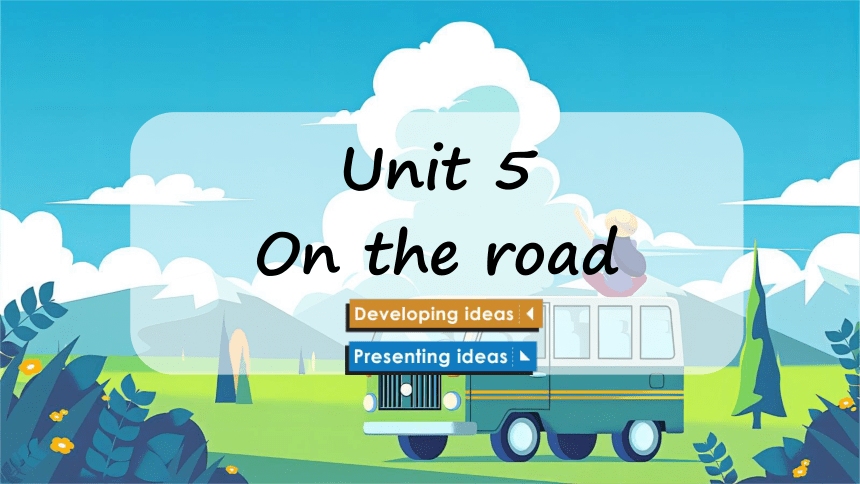 | |
| 格式 | pptx | ||
| 文件大小 | 34.8MB | ||
| 资源类型 | 教案 | ||
| 版本资源 | 外研版(2019) | ||
| 科目 | 英语 | ||
| 更新时间 | 2024-08-26 12:42:19 | ||
图片预览

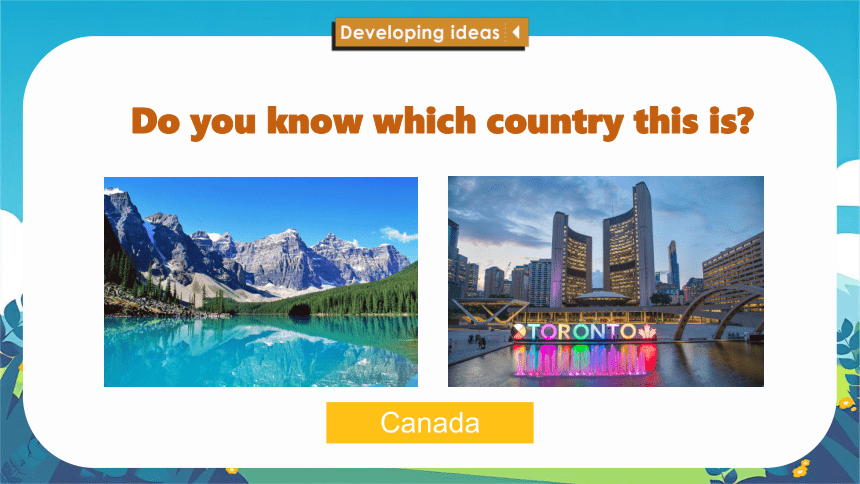
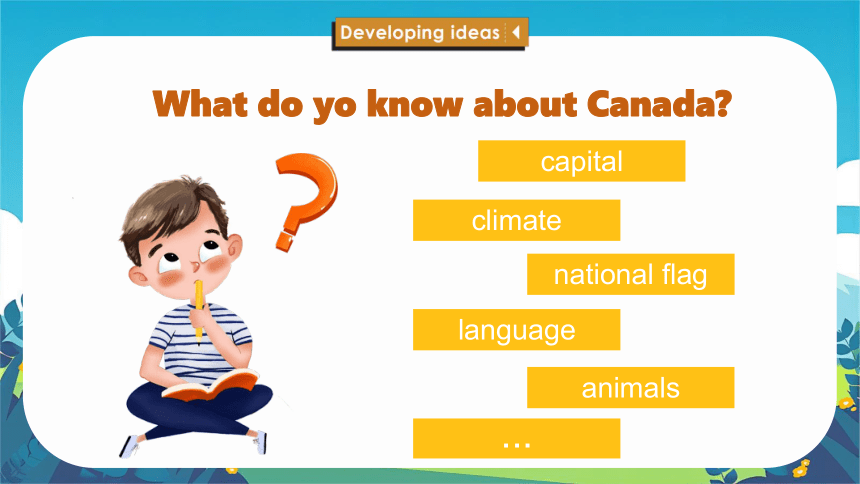
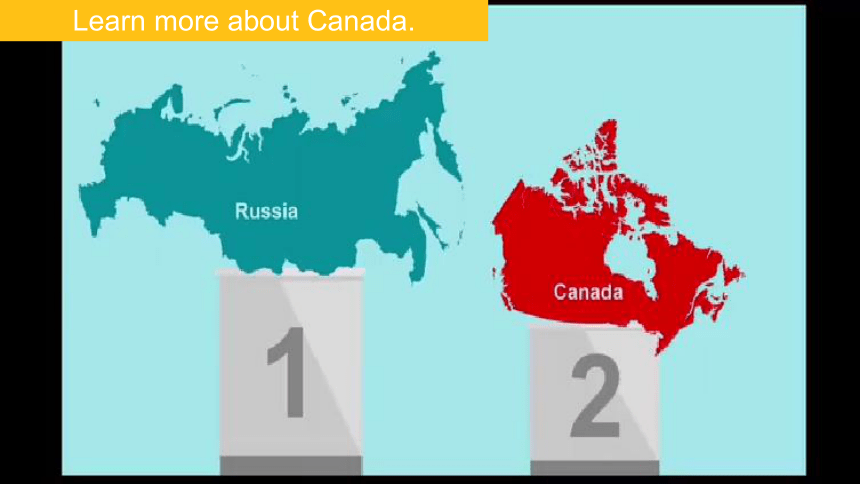
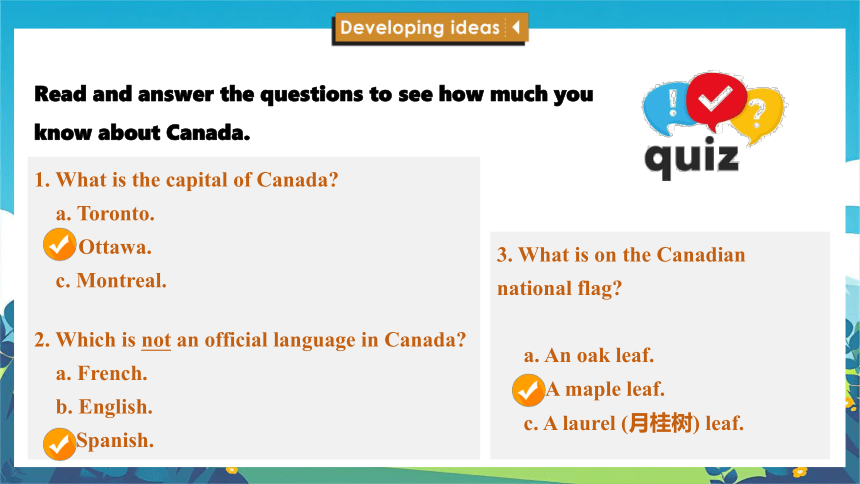
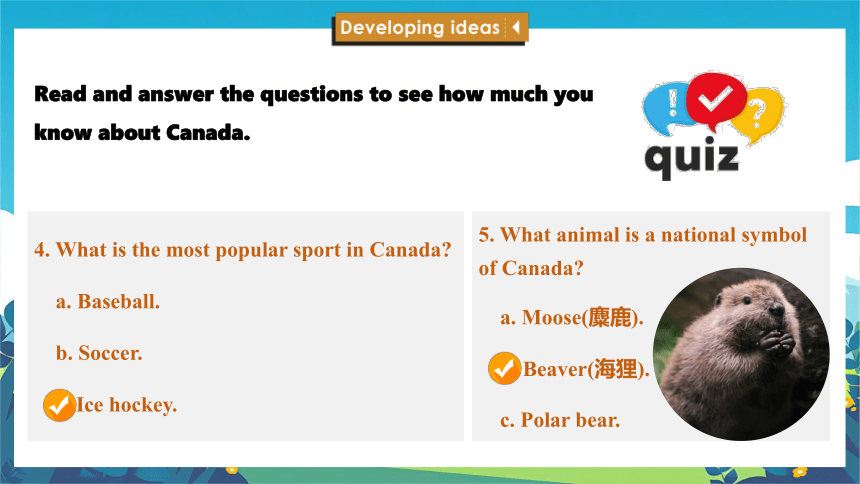
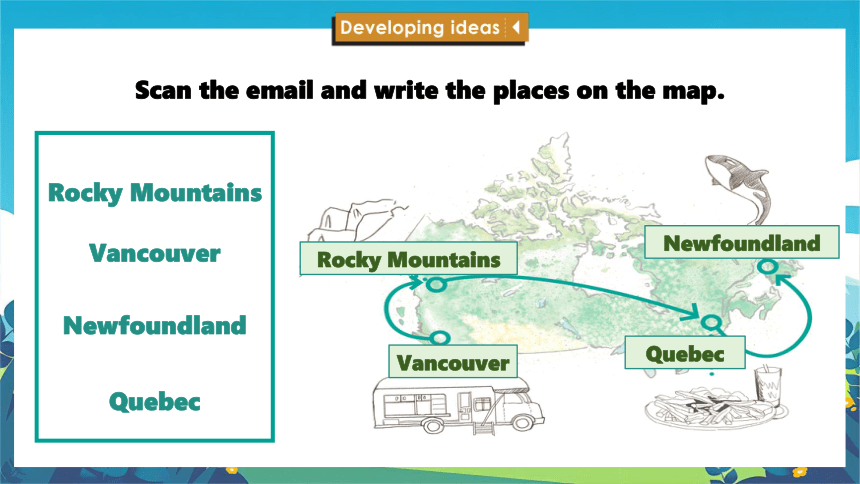
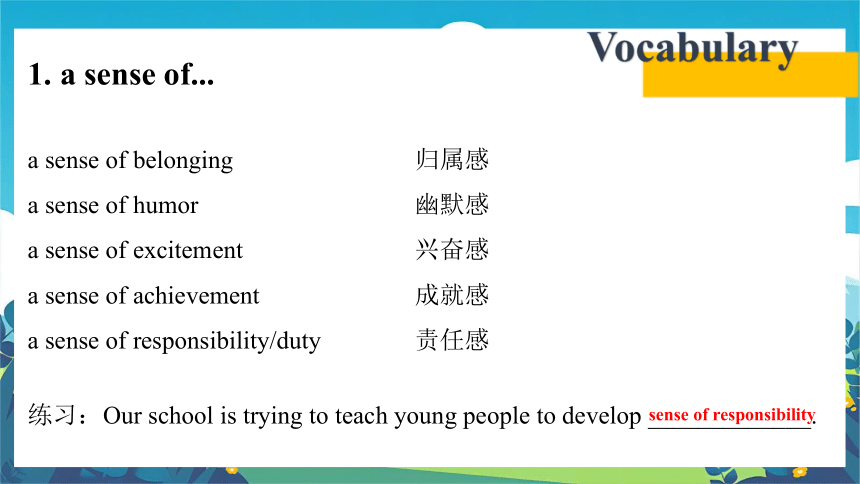
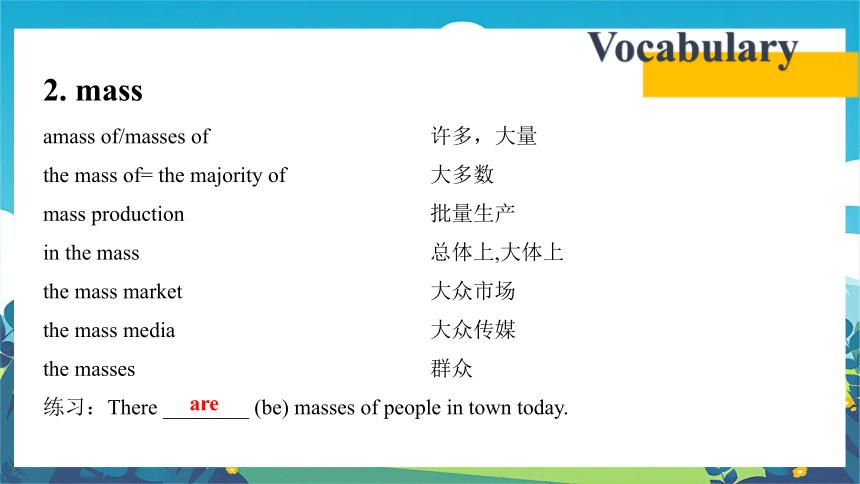
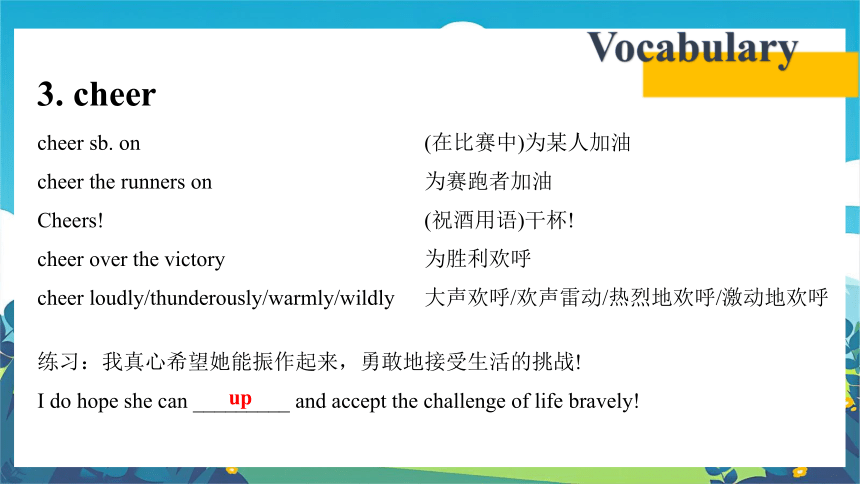
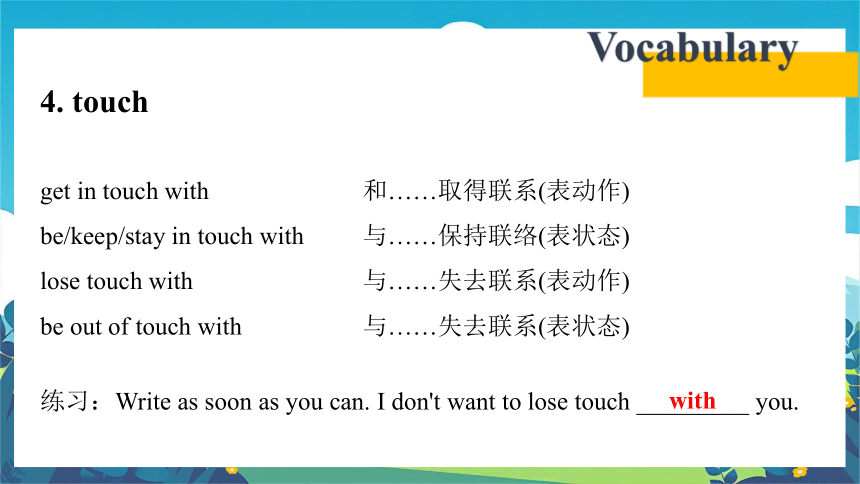
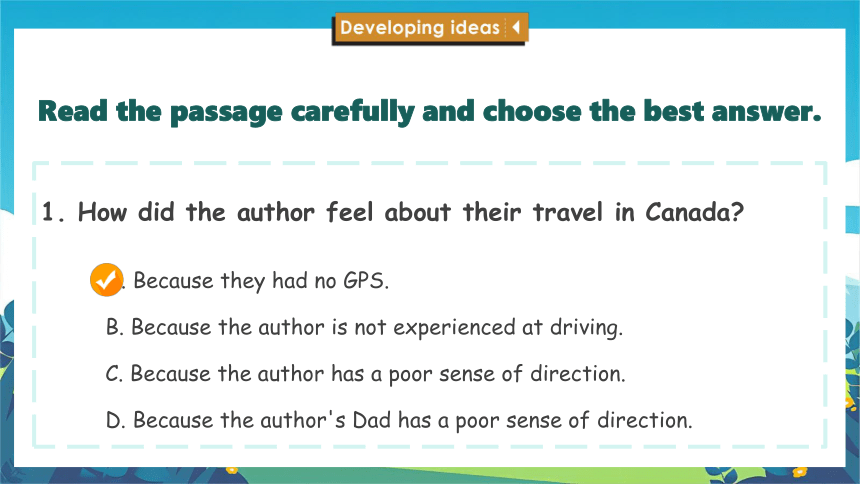
文档简介
(共35张PPT)
Unit 5
On the road
Do you know which country this is
Canada
What do yo know about Canada
capital
climate
national flag
language
animals
...
Learn more about Canada.
Read and answer the questions to see how much you know about Canada.
1. What is the capital of Canada
a. Toronto.
b. Ottawa.
c. Montreal.
2. Which is not an official language in Canada
a. French.
b. English.
c. Spanish.
3. What is on the Canadian national flag
a. An oak leaf.
b. A maple leaf.
c. A laurel (月桂树) leaf.
Read and answer the questions to see how much you know about Canada.
4. What is the most popular sport in Canada
a. Baseball.
b. Soccer.
c. Ice hockey.
5. What animal is a national symbol of Canada
a. Moose(麋鹿).
b. Beaver(海狸).
c. Polar bear.
Scan the email and write the places on the map.
Rocky Mountains Vancouver
Newfoundland Quebec
Rocky Mountains
Quebec
Newfoundland
Vancouver
Vocabulary
1. a sense of...
a sense of belonging 归属感
a sense of humor 幽默感
a sense of excitement 兴奋感
a sense of achievement 成就感
a sense of responsibility/duty 责任感
练习:Our school is trying to teach young people to develop _____________.
sense of responsibility
Vocabulary
2. mass
amass of/masses of 许多,大量
the mass of= the majority of 大多数
mass production 批量生产
in the mass 总体上,大体上
the mass market 大众市场
the mass media 大众传媒
the masses 群众
练习:There ________ (be) masses of people in town today.
are
Vocabulary
3. cheer
cheer sb. on (在比赛中)为某人加油
cheer the runners on 为赛跑者加油
Cheers! (祝酒用语)干杯!
cheer over the victory 为胜利欢呼
cheer loudly/thunderously/warmly/wildly 大声欢呼/欢声雷动/热烈地欢呼/激动地欢呼
练习:我真心希望她能振作起来,勇敢地接受生活的挑战!
I do hope she can _________ and accept the challenge of life bravely!
up
Vocabulary
4. touch
get in touch with 和……取得联系(表动作)
be/keep/stay in touch with 与……保持联络(表状态)
lose touch with 与……失去联系(表动作)
be out of touch with 与……失去联系(表状态)
练习:Write as soon as you can. I don't want to lose touch _________ you.
with
Read the passage carefully and choose the best answer.
1. How did the author feel about their travel in Canada
A. Because they had no GPS.
B. Because the author is not experienced at driving.
C. Because the author has a poor sense of direction.
D. Because the author's Dad has a poor sense of direction.
Read the passage carefully and choose the best answer.
2. Why did the author's family get lost a few times during the trip
A. Because they had no GPS.
B. Because the author is not experienced at driving.
C. Because the author has a poor sense of direction.
D. Because the author's Dad has a poor sense of direction.
Read the passage carefully and choose the best answer.
3. Why was the author's Mum mad on the eighth day
A. Because she was so hungry that they went to a restaurant for lunch.
B. Because she was left behind when taking photos.
C. Because she was not satisfied with the trip.
D. Because she was asked to drive the vehicle.
Read the passage carefully and choose the best answer.
4. What did the author's family do to celebrate their arrival at the destination
A. They went on a boat trip.
B. They took photos together.
C. They went to a restaurant for supper.
D. They visited a local zoo together.
Find out what the underlined words refer to.
1 It took us where we wanted, ...(Paragraph 2)
2 The funniest thing happened on that day.(Paragraph 3)
3 How did that happen (Paragraph 3)
1 “It” refers to “our vehicle”.
2 “That(day)“refers to “the eighth day of our trip”.
3 “That” refers to “Mum’s seat was empty”.
1. Why do you think Eva and her family chose to travel by motor home
2. What do you think Eva enjoyed most about the trip
3. What do you think was the most memorable moment of their trip
Think & share
They chose to travel by motor home because it took them where they wanted, when they wanted.
4. Have you ever travelled with your family
Share your experience with the class.
Think & share
I'd fallen asleep, when I heard Dad's phone ringing.
Sb. had (just) done sth. when…
Sb. had (just) done sth. when… 某人刚做完某事,这时······
I had just fallen asleep when the doorbell rang.
我刚入睡,门铃突然响了起来。
when表示“正在这时/那时”的其他常用句型:
(1) Sb. was doing...when... 某人正在做……这时……
The children were playing football on the playground when it began to rain.
孩子们正在操场上踢足球,这时突然下起雨来。
Sb. had (just) done sth. when…
(2) Sb. was about to do...when.../Sb. was just going to do...when... 某人正要做……这时……
We were about to start when it began to rain.
我们刚要动身,天就开始下起雨来。
(3) Sb. was on the point of doing...when... 某人正要做……这时……
He was on the point of saying something when the phone rang.
他正要说话,这时电话铃响了。
Work in groups.
Imagine you are Eva and give a talk about your travel experience.
1 Use the table to help plan your talk.
2 Organise your talk following the steps below.
Say where you went and who you went with.
Share what you enjoyed about the trip.
Describe what problems you faced.
End by talking about your overall feelings about the trip.
3 Give your talk to the class.
Work in groups.
Give a talk about a movie adapted from a book.
Read the postcard and answer the questions.
1 Who wrote the postcard and from where did she send it
Alice wrote the postcard and she sent it from Yunnan, China.
2 Who is receiving the postcard and where is she
Emma is receiving the postcard and she is in Melbourne, Australia.
Read the postcard and answer the questions.
1 Who wrote the postcard and from where did she send it
She has spent the whole day hiking and seen some huge yaks.
2 Who is receiving the postcard and where is she
She is going to visit the famous old town of Lijiang.
Read the message and write a postcard to Sam. Use the expressions in the box to help you.
a postcard
date
greeting
main body
close
signature
stamp
full name
address
state/city
area code
country
3 March
Hi Sam,
I’ve been here in Beijing for two days and I’m having a great time! Yesterday we went to the Great Wall and today we visited the Palace
Museum. We met some young people from the local university. They helped us take a lot of pictures and told us some interesting facts about the museum. They are really warm-hearted! Tomorrow we are going to take a walk in the Summer Palace and have a taste of the famous Beijing duck. I can’t wait!
Bye for now. Take care!
John
sample
____________________
____________________
____________________
____________________
____________________
Sam Smith
109 Cambridge Court
Liverpool L7 7AG
UK
Work in groups.
Look at the logos and decide which Chinese cities they represent.
Find out what each city is best known for.
Sanya
Beijing
Guilin
beach; coconut
Tian An Men
Peking Opera
beautiful scenery of hills and waters
Choose a different place you know well and talk about why it is worth visiting. Design a logo to represent it.
1 Write a short introduction about why the place is worth visiting.
2 Explain what the logo represents.
3 Practise giving your presentation.
Prepare a short presentation for tourists about the place you've chosen, following the steps below.
Give your presentation to the class, showing your logo.
Use the expressions in the box to help you.
Exercise
1.Take regular exercise for a few months, _________ you will see the benefits to your physical and mental health.
2. _________ (expert) in fashion design create new dress styles for ladies every season.
3.For the more ____________ (adventure) tourists, there are trips into the mountains with a local guide.
4.I love to photograph the _________ (rise) sun.
5.Today I've been photographing a crocodile ____________ (swim) close to our boat, the Kimberley Quest, all day.
and
Experts
adventurous
rising
swimming
Exercise
6.The meeting _________ (hold) now is of great importance.
7.There is no doubt _________ it is unwise to depend completely on the ratings in consumption.
8.Radiation may damage cells in a way that was _________ (previous) unforeseen.
9.It's necessary to set a goal before you do anything, because it can give you a sense _________ direction.
10.Yesterday, we took a maths examination. Now, we can't wait_________ (know) the result of it.
being held
that
previously
of
to know
Review the language points and complete the exercises.
Complete the reflection part.
Homework
See you next class!
Unit 5
On the road
Do you know which country this is
Canada
What do yo know about Canada
capital
climate
national flag
language
animals
...
Learn more about Canada.
Read and answer the questions to see how much you know about Canada.
1. What is the capital of Canada
a. Toronto.
b. Ottawa.
c. Montreal.
2. Which is not an official language in Canada
a. French.
b. English.
c. Spanish.
3. What is on the Canadian national flag
a. An oak leaf.
b. A maple leaf.
c. A laurel (月桂树) leaf.
Read and answer the questions to see how much you know about Canada.
4. What is the most popular sport in Canada
a. Baseball.
b. Soccer.
c. Ice hockey.
5. What animal is a national symbol of Canada
a. Moose(麋鹿).
b. Beaver(海狸).
c. Polar bear.
Scan the email and write the places on the map.
Rocky Mountains Vancouver
Newfoundland Quebec
Rocky Mountains
Quebec
Newfoundland
Vancouver
Vocabulary
1. a sense of...
a sense of belonging 归属感
a sense of humor 幽默感
a sense of excitement 兴奋感
a sense of achievement 成就感
a sense of responsibility/duty 责任感
练习:Our school is trying to teach young people to develop _____________.
sense of responsibility
Vocabulary
2. mass
amass of/masses of 许多,大量
the mass of= the majority of 大多数
mass production 批量生产
in the mass 总体上,大体上
the mass market 大众市场
the mass media 大众传媒
the masses 群众
练习:There ________ (be) masses of people in town today.
are
Vocabulary
3. cheer
cheer sb. on (在比赛中)为某人加油
cheer the runners on 为赛跑者加油
Cheers! (祝酒用语)干杯!
cheer over the victory 为胜利欢呼
cheer loudly/thunderously/warmly/wildly 大声欢呼/欢声雷动/热烈地欢呼/激动地欢呼
练习:我真心希望她能振作起来,勇敢地接受生活的挑战!
I do hope she can _________ and accept the challenge of life bravely!
up
Vocabulary
4. touch
get in touch with 和……取得联系(表动作)
be/keep/stay in touch with 与……保持联络(表状态)
lose touch with 与……失去联系(表动作)
be out of touch with 与……失去联系(表状态)
练习:Write as soon as you can. I don't want to lose touch _________ you.
with
Read the passage carefully and choose the best answer.
1. How did the author feel about their travel in Canada
A. Because they had no GPS.
B. Because the author is not experienced at driving.
C. Because the author has a poor sense of direction.
D. Because the author's Dad has a poor sense of direction.
Read the passage carefully and choose the best answer.
2. Why did the author's family get lost a few times during the trip
A. Because they had no GPS.
B. Because the author is not experienced at driving.
C. Because the author has a poor sense of direction.
D. Because the author's Dad has a poor sense of direction.
Read the passage carefully and choose the best answer.
3. Why was the author's Mum mad on the eighth day
A. Because she was so hungry that they went to a restaurant for lunch.
B. Because she was left behind when taking photos.
C. Because she was not satisfied with the trip.
D. Because she was asked to drive the vehicle.
Read the passage carefully and choose the best answer.
4. What did the author's family do to celebrate their arrival at the destination
A. They went on a boat trip.
B. They took photos together.
C. They went to a restaurant for supper.
D. They visited a local zoo together.
Find out what the underlined words refer to.
1 It took us where we wanted, ...(Paragraph 2)
2 The funniest thing happened on that day.(Paragraph 3)
3 How did that happen (Paragraph 3)
1 “It” refers to “our vehicle”.
2 “That(day)“refers to “the eighth day of our trip”.
3 “That” refers to “Mum’s seat was empty”.
1. Why do you think Eva and her family chose to travel by motor home
2. What do you think Eva enjoyed most about the trip
3. What do you think was the most memorable moment of their trip
Think & share
They chose to travel by motor home because it took them where they wanted, when they wanted.
4. Have you ever travelled with your family
Share your experience with the class.
Think & share
I'd fallen asleep, when I heard Dad's phone ringing.
Sb. had (just) done sth. when…
Sb. had (just) done sth. when… 某人刚做完某事,这时······
I had just fallen asleep when the doorbell rang.
我刚入睡,门铃突然响了起来。
when表示“正在这时/那时”的其他常用句型:
(1) Sb. was doing...when... 某人正在做……这时……
The children were playing football on the playground when it began to rain.
孩子们正在操场上踢足球,这时突然下起雨来。
Sb. had (just) done sth. when…
(2) Sb. was about to do...when.../Sb. was just going to do...when... 某人正要做……这时……
We were about to start when it began to rain.
我们刚要动身,天就开始下起雨来。
(3) Sb. was on the point of doing...when... 某人正要做……这时……
He was on the point of saying something when the phone rang.
他正要说话,这时电话铃响了。
Work in groups.
Imagine you are Eva and give a talk about your travel experience.
1 Use the table to help plan your talk.
2 Organise your talk following the steps below.
Say where you went and who you went with.
Share what you enjoyed about the trip.
Describe what problems you faced.
End by talking about your overall feelings about the trip.
3 Give your talk to the class.
Work in groups.
Give a talk about a movie adapted from a book.
Read the postcard and answer the questions.
1 Who wrote the postcard and from where did she send it
Alice wrote the postcard and she sent it from Yunnan, China.
2 Who is receiving the postcard and where is she
Emma is receiving the postcard and she is in Melbourne, Australia.
Read the postcard and answer the questions.
1 Who wrote the postcard and from where did she send it
She has spent the whole day hiking and seen some huge yaks.
2 Who is receiving the postcard and where is she
She is going to visit the famous old town of Lijiang.
Read the message and write a postcard to Sam. Use the expressions in the box to help you.
a postcard
date
greeting
main body
close
signature
stamp
full name
address
state/city
area code
country
3 March
Hi Sam,
I’ve been here in Beijing for two days and I’m having a great time! Yesterday we went to the Great Wall and today we visited the Palace
Museum. We met some young people from the local university. They helped us take a lot of pictures and told us some interesting facts about the museum. They are really warm-hearted! Tomorrow we are going to take a walk in the Summer Palace and have a taste of the famous Beijing duck. I can’t wait!
Bye for now. Take care!
John
sample
____________________
____________________
____________________
____________________
____________________
Sam Smith
109 Cambridge Court
Liverpool L7 7AG
UK
Work in groups.
Look at the logos and decide which Chinese cities they represent.
Find out what each city is best known for.
Sanya
Beijing
Guilin
beach; coconut
Tian An Men
Peking Opera
beautiful scenery of hills and waters
Choose a different place you know well and talk about why it is worth visiting. Design a logo to represent it.
1 Write a short introduction about why the place is worth visiting.
2 Explain what the logo represents.
3 Practise giving your presentation.
Prepare a short presentation for tourists about the place you've chosen, following the steps below.
Give your presentation to the class, showing your logo.
Use the expressions in the box to help you.
Exercise
1.Take regular exercise for a few months, _________ you will see the benefits to your physical and mental health.
2. _________ (expert) in fashion design create new dress styles for ladies every season.
3.For the more ____________ (adventure) tourists, there are trips into the mountains with a local guide.
4.I love to photograph the _________ (rise) sun.
5.Today I've been photographing a crocodile ____________ (swim) close to our boat, the Kimberley Quest, all day.
and
Experts
adventurous
rising
swimming
Exercise
6.The meeting _________ (hold) now is of great importance.
7.There is no doubt _________ it is unwise to depend completely on the ratings in consumption.
8.Radiation may damage cells in a way that was _________ (previous) unforeseen.
9.It's necessary to set a goal before you do anything, because it can give you a sense _________ direction.
10.Yesterday, we took a maths examination. Now, we can't wait_________ (know) the result of it.
being held
that
previously
of
to know
Review the language points and complete the exercises.
Complete the reflection part.
Homework
See you next class!
